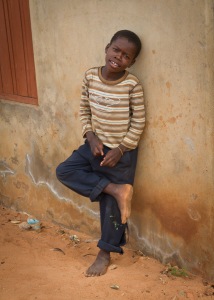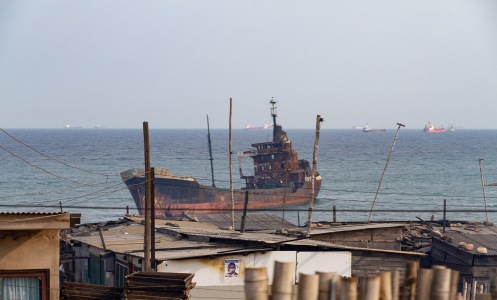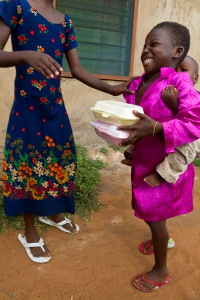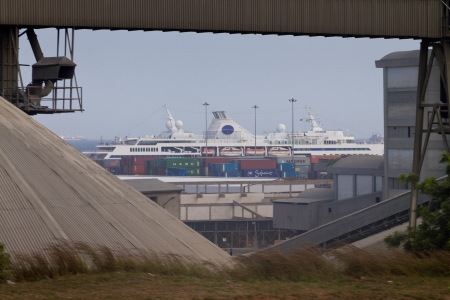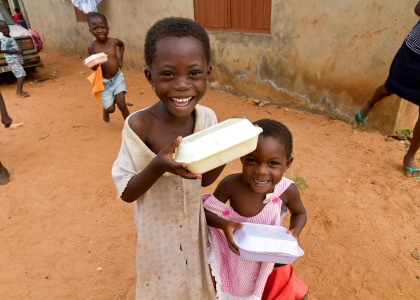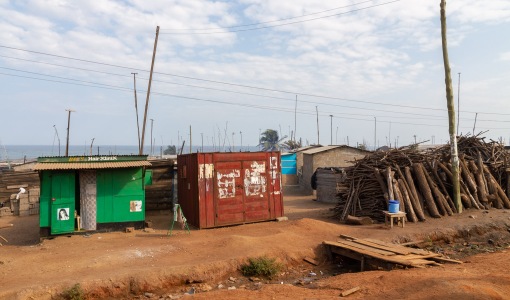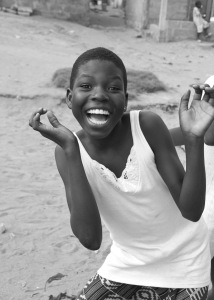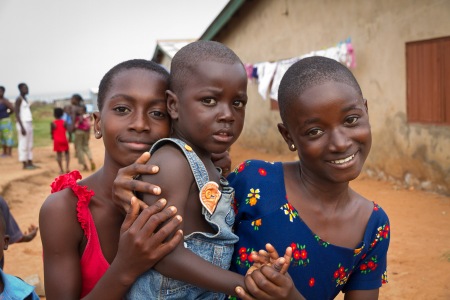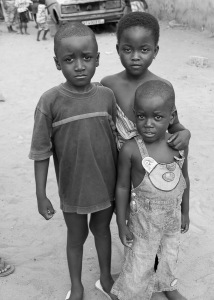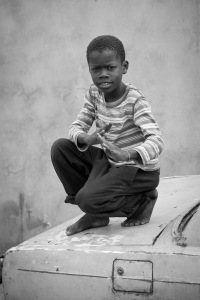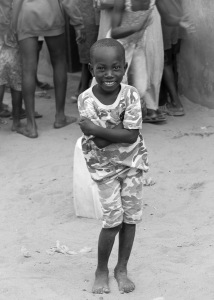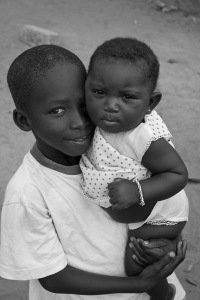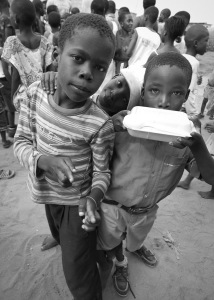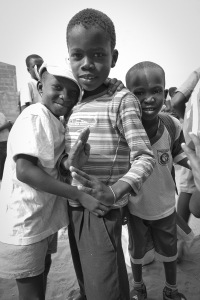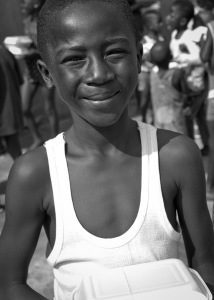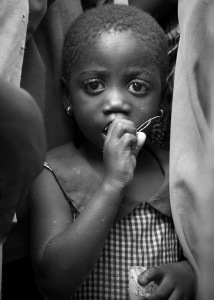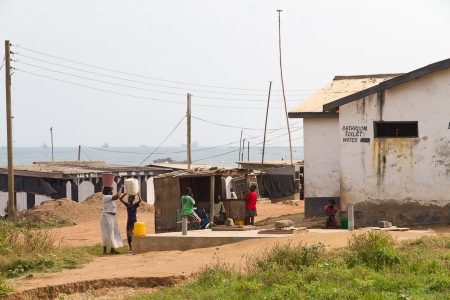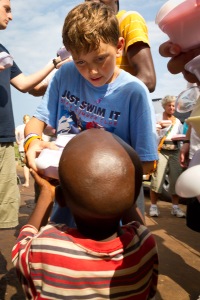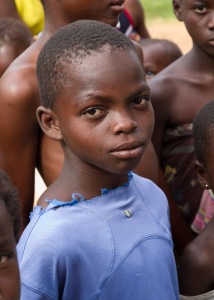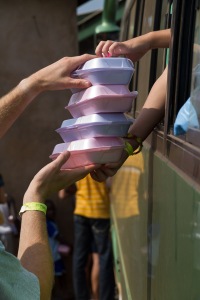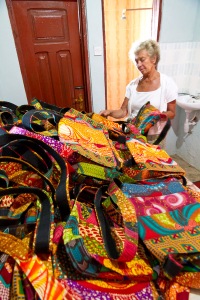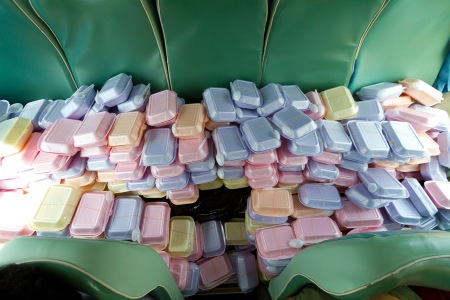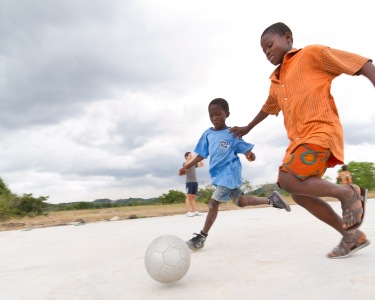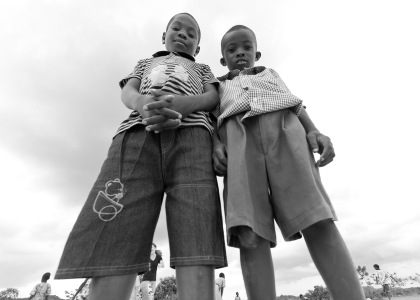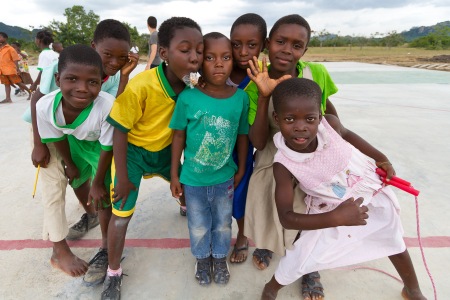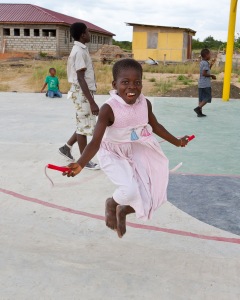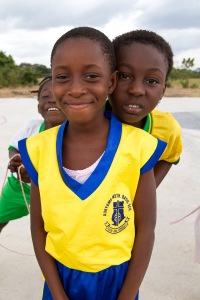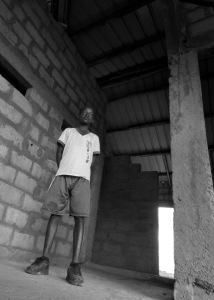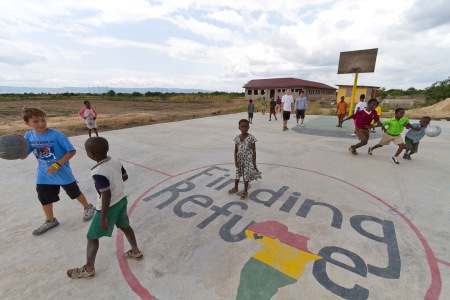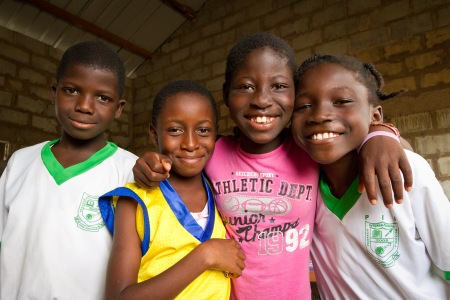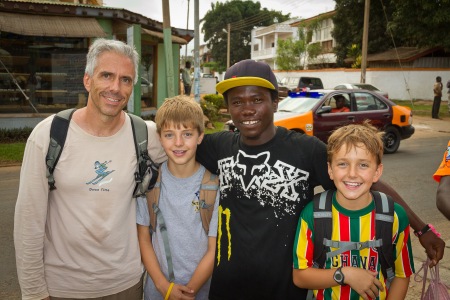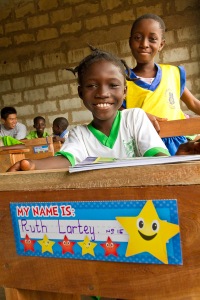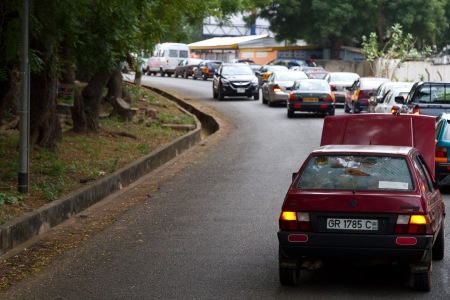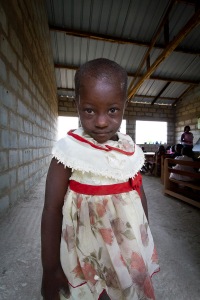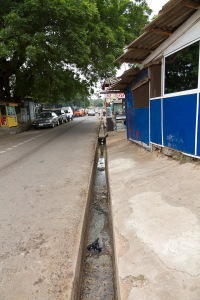September 13, 2011: “We awoke a mile or so off the port, turning perpendicular to the coast and heading straight in. By the time we’d gotten our act together and onto the 6th Deck, a tugboat was pushing us alongside what was to be our berth for the next 4 days. As usual, the Tema Deepwater Port is also industrial; very industrial. As we neared our rather cozy berth, a Ghanaian drum troupe started playing for us, while vendors set up shop beneath tents right before our eyes. The music was very cool, with about a dozen or so people drumming and dancing, one little guy sitting on his little stool, banging his drum to some rhythm in his head or heart. Cars and vans continued to pull up and unload more stuff for more tents, meanwhile dozens of yards in either direction serious work was being performed by large machinery of all sorts. Tate was fascinated by the drumming, and was now thoroughly excited to get off the ship and experience Ghana, maybe even get a drum… [continued below gallery]
We had a quick breakfast and listened to the Diplomatic Briefing in our cabin; some rather dry stuff offered by a former SAS student who was now a U.S. Diplomat in Ghana, and though he hadn’t been here for long, he had a few nuggets of wisdom. Once Customs had gotten through the passport and visa forms, we were cleared to depart the MV Explorer for our city orientation of Accra, the capital of Ghana. Although Accra is a mere 20km from Tema, the rather congested nature of the traffic dictates that the drive can take as long as 1:45! Yikes. SAS is offering a transfer service between the Port of Tema and Accra, but you have to wonder how much you’ll take advantage of it, if it is truly that long a drive.
Two minutes into the drive it became rather obvious that we wouldn’t be walking through this port. Big, gnarly things carrying all sorts of containers everywhere, traffic zipping around; much more chaos than in the Port of Casablanca. The outskirts of the port seemed a weird, semi-sketchy sort of ‘in-between’ land occupied by many people walking, sitting, standing, looking. Just outside the port, the lack of wealth in Ghana–even in contrast to Morocco–was like a slap in the face. My heart started to sink; even after hearing how poor the country is, I guess I wasn’t prepared for it. I tried to keep in mind, however, that this first 10 minutes outside an industrial port that is this city’s main raisón d’etre may not be representative, and bit my lip for awhile. I’m not a fan of pictures while driving, but I’ll stoop to it if the other option is missing something I’ll regret later, but… I simply couldn’t pick up a camera. I kept trying to listen to our tour guide, but all I wanted to do was look outside, take it in, and try and put into perspective what I was seeing from the confines of the air-conditioned tour bus that I started to feel confined by.
As we continued toward Accra with a motorbike police escort (?), the landscape started to change, both cultural and physical. The escort left us at the freeway and we started to pick up speed, passing many concrete block buildings of various sizes, in various states of construction. We passed some homes in a very green area, homes that could have been in Colorado or California, then back to shacks, dirt, industrial gnarl. We got off the freeway, and as the traffic all slowed for the signal, almost in slow motion all these people came from all sides of the road to approach cars to sell miscellaneous things. Bags of water, plantains, nuts, a spiderman basketball hoop, belts, toilet plungers, maps, brooms, peanuts, books, bread rolls, what looked like oversized samosas, toilet paper, sunglasses… You name it, someone had it, and many of the women carry large amounts of it on top of their heads. It appeared to be the way people do casual shopping here, as this stuff was clearly not tourist-related. Our guide, Nee, said that the government was trying to crack down on street hawkers due to the inherent dangers of the practice, but the vocation seems alive and well. As traffic starts to move again, they all disperse, often narrowly avoiding the customers they were only seconds before engaging.
Our first stop was a loop around the University of Ghana, apparently one of the better schools in western Africa. Interesting to see the mix of students, dorms, academic buildings. Saw one 10+ foot tall termite house that we would have loved to stop and photograph. We then stopped at the W.E.B. Du Bois Memorial Centre for Pan African Culture, and learned a bit about the American who helped lead Ghana out from under the oppressive forces so typical of the African continent. I dipped a toe into West African bartering and bought a small canvas painting of some golden huts, paying about 30% of the vendor’s first offer (45 cidis, at 1.5 cidis to the dollar). I told him 10 cidis was all I had in my pocket, and he finally accepted. In contrast to Moroccans, the Ghanaians give you some insight into what they need the money for; family, kids, food, etc. They seem relatively soft spoken, not aggressive, though they are direct, and will also follow you around.
Lunch was a welcome sight from what appeared to be a very nice hotel, though not the local Holiday Inn that President Obama and his family stayed at during his first very first diplomatic visit to an African country. Relative to Morocco, I think he is a bit of a rock star here, but I digress. Lunch was good; a couple of kinds of rice, spicy chicken, some wicked-good fried plantains, plus French fries. Oh yeah, Fanta soda, of course. I remember Fanta Red Cream Soda from when I was a kid, but the brand appears to have as much as departed the U.S., but is very popular over here. Our next stop was the memorial of President Dr. Kwame Nkrumah, who died in 1972. I’ll let you read about the fate of his statue in an image below, and you can Google the rest if interested, as the best part of today has yet to be told.
So, a mere 5 minutes after departing the local bank for an ATM stop, we had stopped beside the road at what looked like a small market. There were all kinds of people outside the bus, with Heidi and Tate sitting on the sidewalk side, where the people were. I heard a slap of the window, and looked over to see Tate peering over the edge looking down at something. He then laughed, and put his fist to the window, which was then joined by a much larger, black fist on the other side of the window. Knuckles! A guy in a grey t-shirt jumped up, his head becoming momentarily visible to me, big smile, looking at me. I exited the bus first and was met by Hassan, who introduced himself to me in very good English. He was excited to meet Reade and Tate, followed by Heidi, and immediately engaged us, asking where we were from, etc. He said he was an artisan who made drums, and asked if we’d like to come play some drums. The boys’ eyes both sparked at this, and we followed him toward the back of the bus, where the ‘opening’ to the market was. I say ‘opening’, because it was hardly as formal a location as a Moroccan medina, not yet even being sure this was anything more than the myriad shanty-stands we’d passed on the drive into Accra.
Anyway, upon getting to the real-world ‘gate’ of the market, the proverbial floodgates were opened, directed squarely at us. People selling jewelry, wood carvings, masks, mini-drums, all aimed our way. I wondered where all our busmates were and why we were receiving all the attention, but as quickly as that thought entered, it was replaced by my consciousness realizing that some guy was asking Tate to write his name in his little mini-notebook, and the four of us were being separated a bit. Hassan stopped though (I realized then that ‘notebook guy’ was making personalized bracelets in Ghanaian colors), and then I tried to keep walking, the chaos of Djemaa el-Fnaa vaguely surfacing in my head. Hassan backed people off a bit, apparently telling them he had us first, and we walked toward his shop, about 50 meters down the fenceline the bus was parked on the other side of.
Hassan welcomed us into his shop, immediately sitting us down with his two compadres, all three of them grabbing drums and starting to play. After about two minutes they grabbed drums for the four of us, and started us through a progression of riffs, each one a bit more complicated. A couple of people outside watched with great interest; I definitely got the feeling that a tour bus full of white people was not the norm here. I looked down, and a little toddler girl peeked her head around the corner from the next stall, hands down in the dirt in apparent crawl-mode, looking at me with eyes as big as you can imagine, staring in wonder at this funny-looking elder from a different planet. In full multi-task mode now, drumming, trying to capture the moment, at the same time taking it all in. By this time the boys and Heidi had graduated to a pretty cool riff, Hassan and his buddies providing welcome shelter from the storm brewing outside as people continually tried to get our attention. They were blown off by either Hassan directly, or another of his friends or family members outside, as it appeared to come time to talk business.
Hassan stopped drumming, and asked the boys what they thought of the drums. Given their newfound bartering skills gained in Morocco, they were contemplative, not wanting to appear overly zealous, though I certainly knew they wanted a drum. We had only changed $100 USD at the ATM, and Heidi made it immediately known that she wasn’t ready to buy anything. I, of course, had to ask Hassan how much the medium-sized drums that the kids were banging on cost. He said 150 cidis, to which Heidi harumphed as being way, way too much, and offered 50. Hassan talked about how he now considered us ‘like family’, and because of that association he would lower it to 100 cidis. I told him I thought we only had 80 cidis, he said 90, but then noted that there was only one drum for two kids, adding that the price goes down for quantity. Now we’re talkin’! At this point, the lovely barter-ess Heidi stands to leave, imploring that we just got here, we don’t know if we want one, we’ll come back tomorrow, and some other sly nugget I think I missed. I, being the big fan of propping up local economies that I am, decided to forge ahead with the ‘two-drum’ scenario. Hassan is already asking how to spell their names so they can carve them into the wood, at which point I add that we are down to 7 minutes til we need to leave, explaining how we’ll get ‘dock time’ if we’re late. I add that I think we might have 100 cidis, but that is it; I think I saw some sort of flash of light (or was that dark?) coming from Heidi’s way, but I couldn’t be sure. Anyway, Hassan says something like “for you, his friends like family, he will accept”, and hustles the drums that Reade and Tate had picked around the corner, to get the names done. Eye-rolling all the way at my buying prowess, Heidi makes up for my cidi-less wad of cash by adding 35 cidis, suggesting I’m a pushover (or something endearing like that; or maybe it was sucker?). I realize that the personalized bracelet-maker is trying to get my attention, showing me the “MR. JEFF IN GHANA 2011” bookmark he has made me, right before my eyes. Well, not really, as I was thoroughly engaged with the whole drum thing. Wondering how I was going to get Heidi to part with a few more cidis to get my bookmark, we had migrated next door where the carving was being done, where the little girl was being handed by her Dad to Heidi to hold, then to Tate. We met her father, then his father, took a few pictures, finishing off with one of all of them, Reade and Tate with their drums, Heidi with the matriarchal look of pacification on her face. We told them we’d try to get back to the African Arts Market in the next two days, and Hassan offered to get a game of soccer going with the boys if we did.
Two minutes til D-Time (dock time, I’ll explain some other day), and Hassan escorts us back to the bus, on the way encountering Tate’s new personalized bracelet. Crap! Think quick, I don’t have a cidi left, Heidi’s got the rest! They want 5 cidis for a bracelet or bookmark, let’s see…“Hey Tate, you have that 5-cidi spot Mommy gave you?” I looked at the guys on either side of me, both wanting 5 cidis, and said “this is it, you guys need to split it, we need to get on the bus, so you guys work it out”. I handed it to one of them and we walked (not even sure which one, but I hope it was the ‘Mr. Jeff’ guy, as his was more work, and he somehow spelled my name right). During the 25 meter walk to the bus, we were absolutely barraged by others on all sides, our obvious loot in hand, no one believing that we didn’t have any more money, which we really didn’t.
That was a 35 minute whirlwind I’ll never forget, and I really didn’t want to get back on the bus.
On the way back to Tema, a little slice of life for you: I happened to notice a guy on the other side of the road, standing in the dirt, back to us, likely peeing, a rack of some sort of wares to sell on his head. As he turned, his hand was down his pants re-arranging, and within 20 more seconds he had picked his nose, and then reached down to rub his finger on his momentarily flipflop-less foot. Note to self: whatever that guy’s selling, I’m not buying!
Tons of traffic on the way back, must be commute, as we’re due back at the ship at 1800. We pull over behind one of our other buses, hazards on, and I wondered if they had broken down. All of a sudden the crazy motorcop buzzes by, and both buses take off after him, our ticket to vehicular paradise. Now, our initial escort to the freeway this morning was a bit odd, but this became positively weird! The motorcop split the two lanes of traffic going our direction swerving wildly between the lanes to get the cars to part and basically pull over to the side, while the bus, honking, split the newfound middle. Navigating these parted waters was way, way quicker than sitting in traffic, and you could see that the locals were wondering why, looking puzzled as the bus breezed by. At one point, we actually stopped on a freeway and flipped a U-turn into the on-ramp, where a police truck had stopped traffic, our motorcop up ahead. Cars jammed everywhere, he then led us into the oncoming lane of traffic, which was now completely clear for our wrong-way, three-hour tour. Seriously, wrong direction on roundabouts, splitting freeway lanes at 100 km/hr, wrong way up an onramp, moving cars onto the shoulder as necessary; you name it, we did it. We all felt really weird about it, as it wasn’t like we were some diplomat requiring escort to somewhere important. It was just positively otherworldly, and you had to wonder how the heck someone had been able to pull the strings to enable such wildness… for us.
EPILOGUE: What an amazing thing for some random guy to see Tate through a bus window, engage him with ‘Knuckles!’, then discover that he makes the exact thing that both Tate and Reade want to bring home from Ghana. In retrospect, Hassan gave us immediate, controlled shelter from the storm of vendors, provided a very cool hands-on drum demonstration, and welcomed us into his little circle of friends and family that make these drums, right there in that shack, to export around the world. Was it to sell us a drum? Well, of course it was, but he invited us back for a game of soccer, and I have to admit that the experience–all 35 minutes of it–was as substantive and meaningful as I’ve had in a long time. I hope we can go back.
If you’d like to visit my original Blogspot post for this country, please start here: 9/13/11: Accra, Ghana

